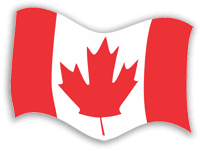|
The uneasy compromises that governed relations between English
and French Canadians began to break down in the 1950s.
French-Canadians had usually, if sometimes grudgingly, accepted
that they were part of a Canadian nation, even if it meant that
they had to cohabit with an English-speaking majority. A
better-educated and more prosperous population in Quebec began
to seek more elbow room — better jobs in the corporations
headquartered in Montreal; the ability to use their own language
in government; and if the national government in Ottawa did not
allow that, why not a government of their own, one that spoke
French? A new nationalism, not Canadian, not French-Canadian,
but Québécois — a new word — came into being, and as the 1960s
advanced, it proved more and more attractive to many of the
French-speakers of Quebec.
As a result, Quebec society in the 1960s was bitterly divided.
Many Quebeckers, French as well as English, preferred things as
they were, or expected that the ordinary course of Canadian and
Quebec democratic politics would change things. Some
English-Canadians were waking up to the need for change and for
new compromises to govern English-French relations. The prime
minister, Lester B. Pearson, was among them, and he sought out
strong French-Canadians to run for election for his Liberal
party. He was successful, and among his new Members of
Parliament was a rich Montreal intellectual, Pierre Elliott
Trudeau, who was elected to Parliament in 1965 and quickly made
federal minister of justice. In one of the most unusual
political conventions ever held in Canada, the Liberals in 1968
made Trudeau Pearson’s successor and prime minister of Canada.
And so it was Trudeau who had to confront what was possibly the
greatest crisis Canada had ever faced. By 1968 Quebec separatism
was proving more and more attractive, especially to a young and
impatient generation of French-speakers in the province. The
1960s were a time of ferment and revolution everywhere in the
Western world, and revolutionary Marxism was attractive to
fringe groups of radicals — it offered both an explanation and a
justification for grievances against what was called “the
system.” Small groups of terrorists had appeared in Quebec
starting in 1963, setting off bombs at armouries, in mailboxes,
or at the Montreal stock exchange. There were riots in Montreal
in the late 60s. At one, in June 1968, a steely Trudeau had
stared down the rioters on national television, while other
prominent Quebeckers ran for cover.
In the Quebec provincial election in April 1970, the Liberals
under Robert Bourassa scored a decisive victory over a
separatist party, the Parti Québécois. Bourassa was young and
untried, but he had a strong majority in the Quebec legislature
and a strong cabinet behind him — and the Liberals of Quebec
were, of course, allied with the Liberals of Ottawa, under
Trudeau.
Not everyone accepted the result. Small groups of Marxist
revolutionaries gave themselves the name of the Front de
Libération de Québec (Quebec Liberation Front) and embarked on a
campaign of minor terrorist acts. They were few in number, but
they believed that a striking revolutionary act would attract
thousands to their side — and in the tense atmosphere of 1970,
they were not entirely wrong.
First, the FLQ kidnapped the British trade representative in
Montreal in early October 1970. It was an attention-getter, but
it did not immediately bring mobs into the street or bring the
government to its knees. So they kidnapped Quebec’s minister of
labour, Pierre Laporte. That got attention. Students in Montreal
became excited. Meetings of support were held. Nationalist
notables in Quebec, some separatists, some not, urged that the
elected government step down and make way for a government that
would negotiate with the FLQ.
That drew Trudeau’s attention. For the prime minister, it was
completely inadmissible to allow democracy to give way to mob
rule. The provincial government panicked and asked for federal
troops. These were sent. Laporte was then murdered, and the
federal government proclaimed a state of emergency, using an old
1914 law called the War Measures Act. Hundreds of suspects were
rounded up and imprisoned; soldiers patrolled the streets; and
revolutionary propaganda was forbidden.
Trudeau had chosen the right moment. The would-be
revolutionaries crept into hiding, if they had not been
arrested. The mobs never appeared. Quebec society was appalled
at the murder of Laporte. The diplomat’s kidnappers were found,
and the Briton was released; and Laporte’s murders were also
found, tried, and convicted.
The October Crisis put an end to a decade of revolutionary
violence in Montreal and Quebec. It did not put an end to
separatism, but it channelled Quebec politics back into
democratic and law-abiding habits. Trudeau’s vigorous defence of
the rule of law and democratic government had preserved Canada.
Quebec might or might yet not go its own way, but if it does, it
will be by a democratic process. That was the lesson of October
’70.
Next Instalment: The Beginnings of Canadian Multiculturalism
The Canadian Experience is a 52-week
history series designed to tell the story of our country to all
Canadians. Sponsored by Multimedia Nova Corporation and
Diversity Media Services partners, the series features articles
by our country’s foremost historians on a wide range of topics.
Past articles and author bios are available at
http://www.cdnexperience.ca. The Canadian
Experience is copyright ©2010-2011 Multimedia Nova
Corporation.
|
|
 #29 The October Crisis
#29 The October Crisis
